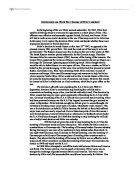To what extent were Hitler's successes in 1939-1940 due to the weaknesses and mistakes of Germany's opponents?
To what extent were Hitler’s successes in 1939-1940 due to the weaknesses and mistakes of Germany’s opponents?
I think that Germany’s successes from 1939-1940 were largely due to the weaknesses of her opponents, however some credit has to be given to the German military and Hitler’s leadership/planning.
Clearly the weakness of Germany’s opponents in preparation for war greatly aided Germany’s success. Hitler’s first success in Poland showed the lack of preparation by Germany’s opponents. On September 1, 1939, Germany invaded Poland. The Polish army expected the attack to come along the Polish frontiers, but Hitler introduced blitzkrieg. This caught the Poles unaware whilst at the same time waves of German bombers targeted railways and the Polish transport network, which crippled Polish military mobilization. Hundreds of tanks smashed through Polish defences and rolled deep into the country. The Poles fought hard, but on September 17, the Soviet Union invaded their country from the east. By the end of the month, Poland had fallen. The success of this campaign was mainly due to the weakness of the Polish military, planning and the failure of Britain and France to come to their allies aid. The Polish army had failed to modernise and formed a 1,700 mile trench. This meant that the army stood little chance against armour along a front that was not particularly strong in any place. The weakness of the Polish army meant a swift victory for a modern German army was inevitable. The same type of victory against France would prove to be down to similar reasons.
The campaign against France showed the ineptitude and weakness of the allies. One of the major factors in the German success in France was the poor pre-war planning and leadership. This fundamental weakness made the German invasion quick and successful. Throughout the inter-war period French military leadership held strongly to the believe that any future invasion would come through Belgium. Thus, France began the construction of the Maginot Line along the north eastern frontier in the hope of forcing a Schlieffen Plan style attack. The idea of an attack through the Ardennes was ruled out due to the hilly terrain and dense forests. These conclusions showed how flawed French planning was and come the time of the invasion Hitler’s main assault army faced little opposition since only a few poorly trained French divisions guarded the Ardennes. This lack of pre war planning would prove to be a big mistake and made a weak allied army even weaker. Had planning been better France could have caused Germany some considerable casualties in the Ardennes since there was little room for manoeuvre if the German forces had come under serious attack there. However there was no artillery or airforce covering the area due to the fact France had moved most of its military resources to Belgium.







